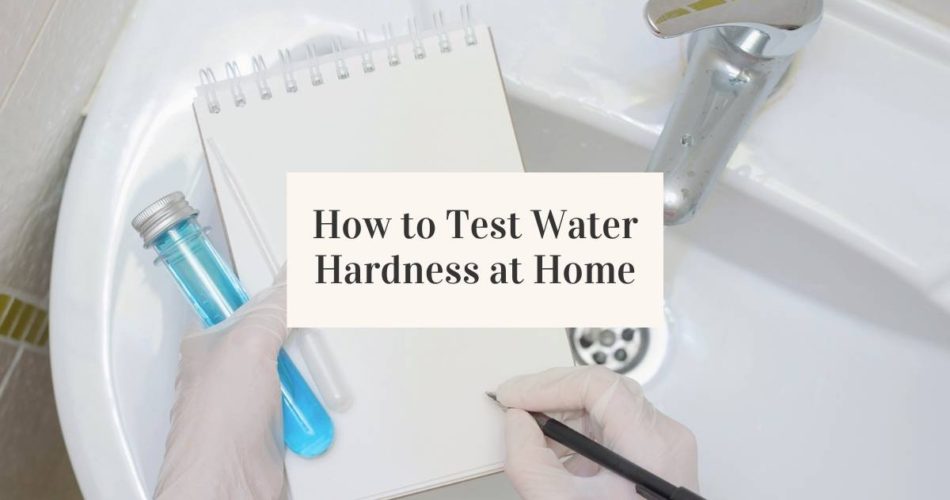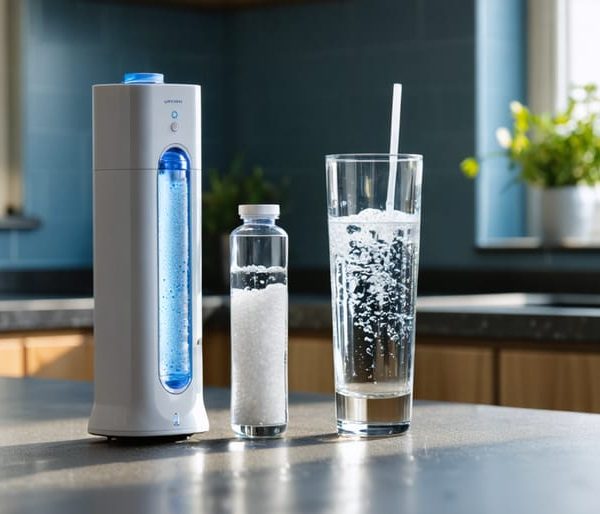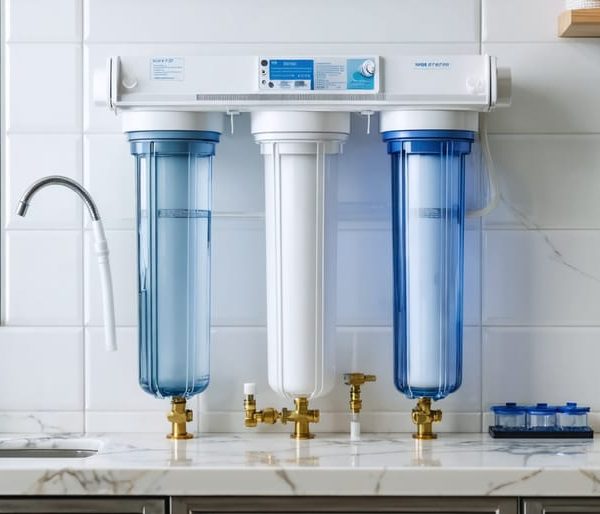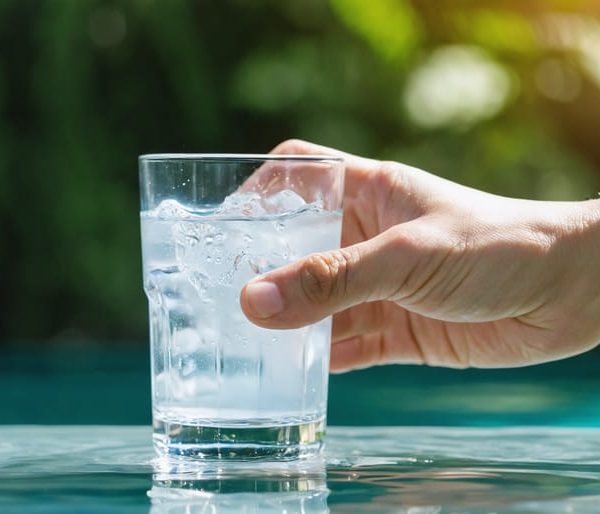The easiest way to test water hardness at home is by washing your hands with a basic soap. If the water is soft, you will see a lot of bubbles. If the water is hard, you will see much fewer bubbles. This is because pure soaps don’t froth and sud in hard water.
The problem with such DIY experiments is that they reveal nothing about the level of water hardness and water quality. Because there is so much riding on a test for hard water, it is essential you pick the right one to help you understand the depth of your water problem and to take the right steps to solve it.
How Is Water Hardness Measured
According to the United States Geological Survey (USGS), hard water contains high levels of dissolved minerals such as calcium and magnesium, and some other metals. Generally, water systems that source groundwater are concerned about the hardness. The water tends to carry naturally occurring minerals to the water supply as it moves through rock and soil.
That is why it is not uncommon for municipalities to keep a check on the water supply’s hardness level and provide homeowners with a water quality report. To examine the water hardness of your home water supply, it’s imperative to understand how to measure water hardness. First off, there are varying degrees of hardness, ranging from soft water to very hard water.
Secondly, water hardness (concentration of calcium carbonate) is generally measured in grains per gallon:
As per the Water Quality Association, the hardness scale can be described as follows:
- More than 10.5 grains per gallon of calcium carbonate = very hard water
- 10.5 to 7 grains per gallon of calcium carbonate = hard water
- 7 to 3.5 grains per gallon of calcium carbonate = moderately hard water
- 3.5 to 1 grain per gallon of calcium carbonate = only slightly hard water
- Less than 1 grain per gallon of calcium carbonate = soft water
Keeping the above hardness scale in mind will help you understand your local water authority’s water quality report or any other water analysis results you plan on getting.
Six Ways to Test Hardness of Water at Home
The most accurate test results and detailed water quality reports come from an independent laboratory. However, a comprehensive water test is expensive. If you want to get a rough idea of whether your water is hard or soft, try one of these DIY tests below. Please note, that not all hard water tests are created equal, and some are more accurate and sensitive than others. Before going through our list of ways to test for hard water, you must understand how to navigate the section.
We have arranged the tests according to their degree of accuracy. If you are interested in getting precise and detailed test results, we recommend scrolling to the end of the list.
1. Testing Hardness of Water With Soap

One of the easiest methods to test your home water for hardness is the soap lather method. As the name suggests, all need to do is lather your hands with pure liquid soap and observe the number of bubbles produced.
If your tap water is soft, your soap should produce plenty of bubbles. Conversely, if the water is hard, there will be fewer bubbles, and the soap will stick to your skin, creating a type of film – instead of suds. The hardness minerals present in hard water cause a chemical reaction when they come into contact with soap and prevent the soap from lathering. In fact, that’s also primarily why hard water causes skin and hair dryness.
You can use any pure soap for this method for accurate results because most modern soaps include chemicals that help the soap create suds in all types of water.
2. Checking for Signs Visually
Another straightforward method of testing water hardness is conducting a visual check-up of objects that come into contact with water on a regular basis. That means closely inspecting your sink, bathtub, showerhead, utensils, plates, etc. If your water supply does contain hard water, you’ll notice signs of scaling – specifically on your bathroom faucets and dishes.
3. The Water Glass Test
You can also test your home water for hardness through the water glass test. Take a clean, clear, and empty glass and fill it with water until it’s filled one-third of the way. Next, dribble two or three of pure liquid soap into the water.
If the water inside the glass remains cloudy, the water is hard. Conducting the same test with soft water will produce copious amounts of suds, and the water resting at the bottom of the glass will be clear and non-cloudy.
Once again, try not to use regular soap or detergents for this test because most soaps contain chemicals to counteract the minerals present in hard water. Instead, use castile soap in a bar or liquid soap form for best results.
4. Water Hardness Test Strips
Thus far, we’ve discussed tests that you can conduct yourself without too much effort. But, if want precise results, you can look into purchasing a home water test kit.
These test kits are readily available at most home improvement stores and major online retail sites. Testing methods can vary from kit to kit; however, these tests are designed to gauge water hardness and measure alkalinity, iron, chlorine, and nitrates. Best of all, a hard water test kit will provide you with instant results and can help you decide on a fitting solution for your water problems.
More often than not, hard water test kits will include a color chart and test strips. Think of it as the hard water equivalent of a litmus test. Carrying out the test is quite simple. All you need to do is fill a glass with water from the tap and insert the test strips for the instructed amount of time.
Once the waiting period is over, compare the color of the test strip to the color chart to discover the hardness level of your home water. Also, note that you should avoid holding the test strips under running water because this can lead to inaccurate results.
5. Checking With the Local Water Authorities
The United States Environmental Protection Agency (EPA) regulates community water systems. It requires them to send customers an annual consumer confidence report (CCR), also known as the drinking water quality report. These reports are designed to promote transparency and educate the masses about the quality of their drinking water.
If you don’t pay your water bill on account of living in an apartment or rental property, it’s likely you won’t receive a CCR. But, that doesn’t mean you can’t contact your water authority yourself to gain information about your water supply, including its source, regulated contaminants, and of course, hardness level.
6. Water Testing Labs
If you want a testing method that’s even more accurate than a hard water test kit, you’re number one option is sending a sample of your drinking water to a lab for results.
If you’re unsure about whether such a facility exists in your area, you can go through the CDC’s Public Health Professionals Gateway to get in contact with your local department of health to discover a local testing facility. What’s more, you may need to visit the facility to acquire a sterile container for your water sample. Also, consult with the technicians at the facility about the time window for the samples to reach the lab.
You also have the option of approaching a private lab for your hard water test results. The only difference is that private labs generally charge more than university or government labs. However, the results of the private or government lab are highly accurate. For instance, lab results won’t just mention the hardness level (in milligrams per liter) but will also list out contaminants, sodium (or salt) levels, pH levels, etc.
Water Softener Options
Households facing hard water-related problems can invest in a water softener that’ll help remove minerals like calcium and magnesium from their water supply.
Until recently, salt-based water softeners were a popular solution for water hardness. And, while these softeners are pretty effective, they’re not without issues of their own. For example, a salt-based water softener can release a lot of salty wastewater – which has environmental impacts. The salt content produced by such softeners can also adversely affect human health.
Thankfully, there are also salt-free water softeners, which are safer for human consumption and more ecologically friendly. These softeners work by crystallizing hard water minerals so that your household water supply remains safe from the ill effects of water hardness. Additionally, you can also look for softeners that don’t run on electricity if you’re concerned about rising energy costs.
The best option is to get in touch reputable water filtration firm to inquire about the best water softener for your home based on your situation and preference.
Conclusion
Sometimes there’s no avoiding hard water-related concerns. However, a hard water test is crucial to understand the depth of the problem you face and help you choose a viable solution. Understanding the degree of hardness of your water supply can help you select a suitable water softener that’ll help you curb the damage hard water can wreak on your home and health.
If you’re looking for precise and accurate results for a hard water test, it is best to rely on methods like hard water test kits or lab testing. On the other hand, if you’re interested in a test method that’ll help you gauge the efficacy of your water softener, you can rely on the less scientific test methods mentioned here.



